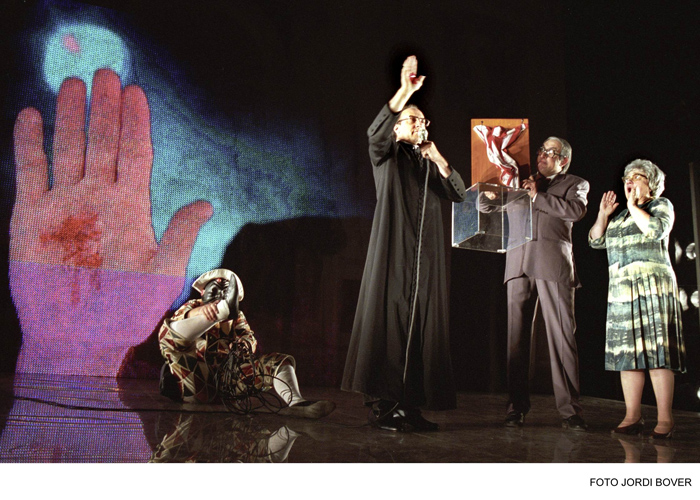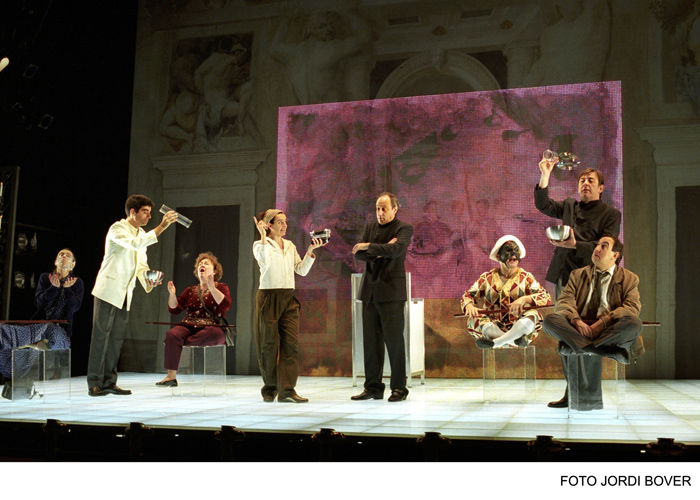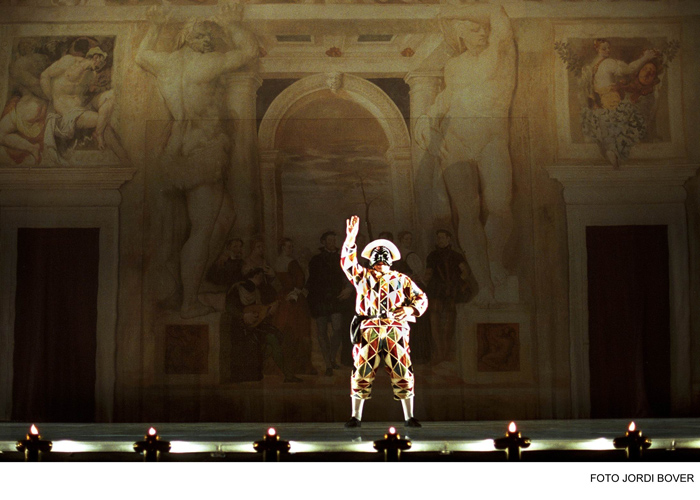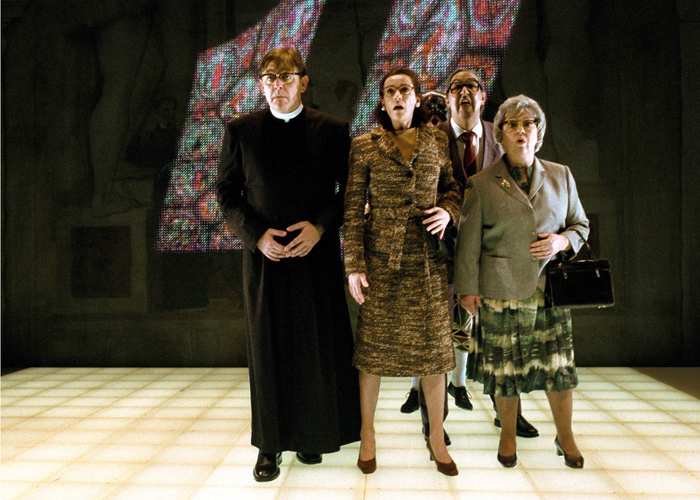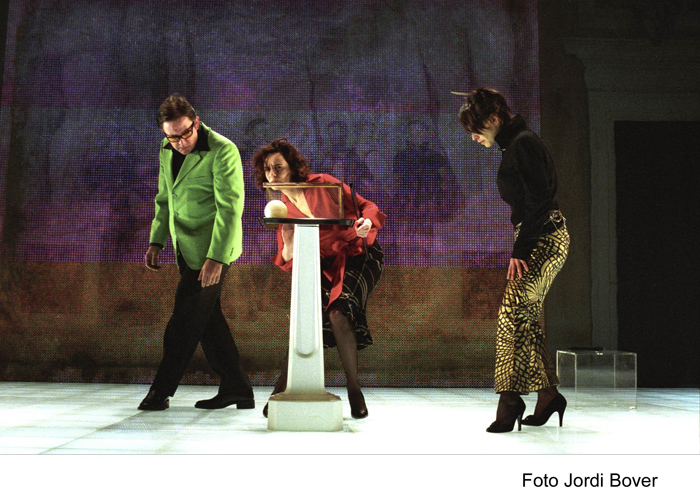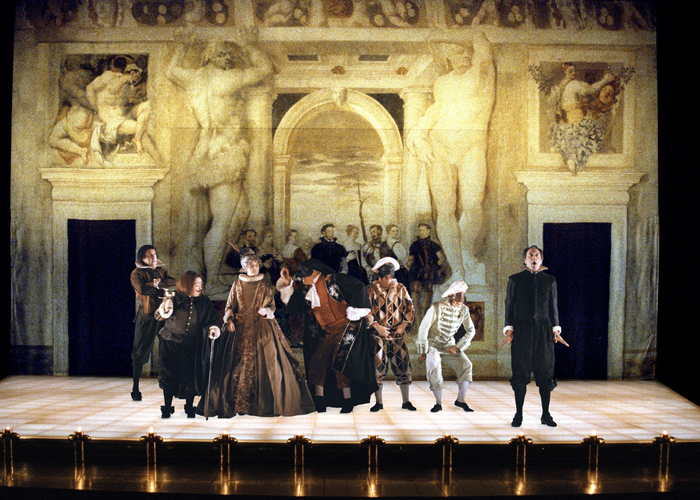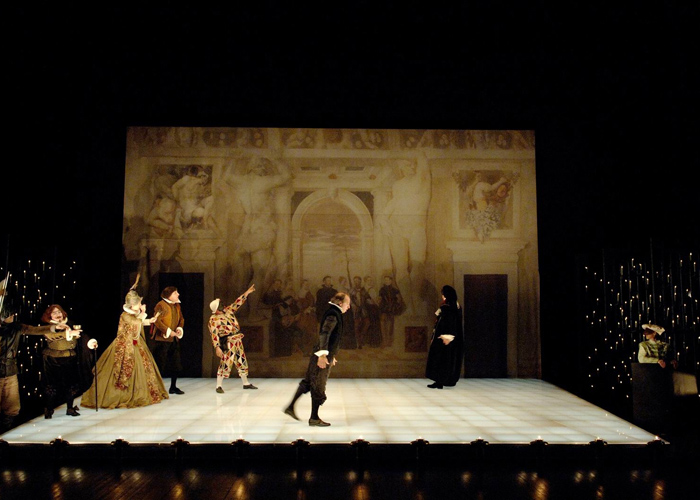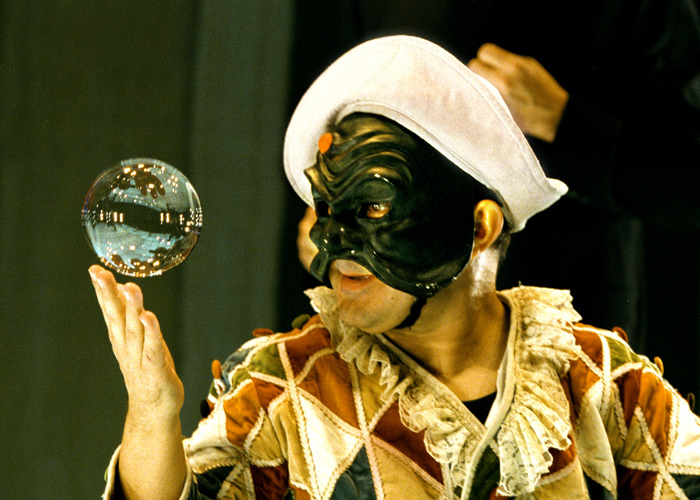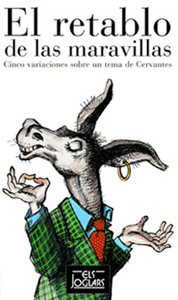
la obra
CINCO VARIACIONES SOBRE UN TEMA DE CERVANTES
Estrenado el 9 de enero de 2004 en el Teatro Lope de Vega de Sevilla.
Se representó hasta el 12 de junio de 2005
Los mecanismos que rigen el comportamiento humano muestran una evolución tan extremadamente lenta que apenas pueden notarse sus diferencias entre el conjunto de obras que configuran la historia del teatro. Ello lo demuestra la validez de tantos dramas construidos hace mas de dos milenios y medio, los cuales siguen figurando entre los grandes mitos de la humanidad.
Bajo este prisma, la distancia que nos separa de Cervantes es ínfima, y así, las situaciones presentadas en su entremés “El Retablo de las Maravillas” siguen hoy produciéndose e incluso multiplicándose bajo el poder de los medios de comunicación.
Por consiguiente, y a fin de no incurrir en el mismo defecto de lo que denunciamos en estas variaciones del retablo, contaremos con absoluta franqueza el proceso que nos ha llevado a ello.
El primer motivo y quizá el más esencial es la necesidad de hacer algo para conseguir que veinte personas continúen subsistiendo del teatro. Después nos encontramos con ocho magníficos actores que deben multiplicarse en numerosos papeles, pues tampoco contamos con los medios de los teatros públicos. Luego tenemos que emplear una costosa pantalla electrónica que todavía no hemos amortizado, y finalmente, disponemos de los taquillajes conseguidos con la producción anterior que nos permiten una cierta libertad, o sea, no depender de que ninguna institución, por el hecho de pagarnos el invento, condicione el producto.
Una vez asumidos estos ineludibles ingredientes (tampoco lo consideramos limitaciones) podemos dedicarnos a toda clase de disquisiciones, que en esta ocasión, se sintetizaron sobre la paradoja clásica de como los cretinos pueden vendernos la nada a costa del temor de sus semejantes a pasar por cretinos. No obstante, a pesar de ello, la humanidad ha seguido evolucionando porque siempre han aparecido en última instancia niños denunciando la desnudez del rey. Sin embargo hoy los niños están domesticados, los artistas comprados con dinero público y los filósofos ejerciendo de funcionarios. Así, los retablos campan a sus anchas promocionados por las más altas instituciones y vendidos por los media aprovechando que “cada día que amanece…”
DIRECCIÓN
Albert Boadella
ACTORES
Xavier Boada
Dolors Tuneu
Pep Vila
Ramon Fontserè
Xavi Sais
Jesús Agelet
Ramon Fontserè
Minnie Marx
Pilar Sáenz
EQUIPO ARTÍSTICO
Ayudante de dirección: Lluís Elias
Asistentes a la dirección: Xavier Boada y Joan Roura
Vestuario: Dolors Caminal
Realización máscaras: Lluís Traveria
Posproducción vídeo: Elf Pla
Colaboración literaria: Josep M. Arrizabalga
Adap. musical del Canon de Pachelbel: Jordi Reguant
Interpretado por: Jordi Reguant, Marju Vatsel y El Cuarteto de Barcelona: Marc Armengol, Urike Janssen, Edurne Vila y Sergi Boadella
Iluminación: Cesc Barrachina
Sonido: Guillermo Muguar
Pantalla electrónica: Jordi Costa
Técnicos de escenario: Jesús Díaz Pavón y Josep Abellan
Dirección técnica y realización escenografía: Jordi Costa
Director de producción: Josep M. Fontserè
Construcción escenografía: Tallers Pascualín
Realización vestuario: Atuendo for fun – Rosa Mª Pardo
Atrezzo: Castells i Planas
Forja en hierro: Fernando Garreta
Composición fotográfica: Eulàlia Grau
Operador de cámara: Xavier Crespiera
Imágenes pantalla: Archivo Els Joglars
Diseño gráfico: Jaume Bach – Manuel Andreu
Fotografía: Jordi Bover
Preparación física: Sílvia Brossa
Intendencia: Montserrat Balmes
Asistente de intendencia: Imma Rierola
Control de ámbitos: Josep M. Matavaques
Coordinación giras: Sergi Subriachs
Prensa y comunicación: Cristina Ferrández
Producción y distribución: Els Joglars
UNA PRODUCCIÓN DE


